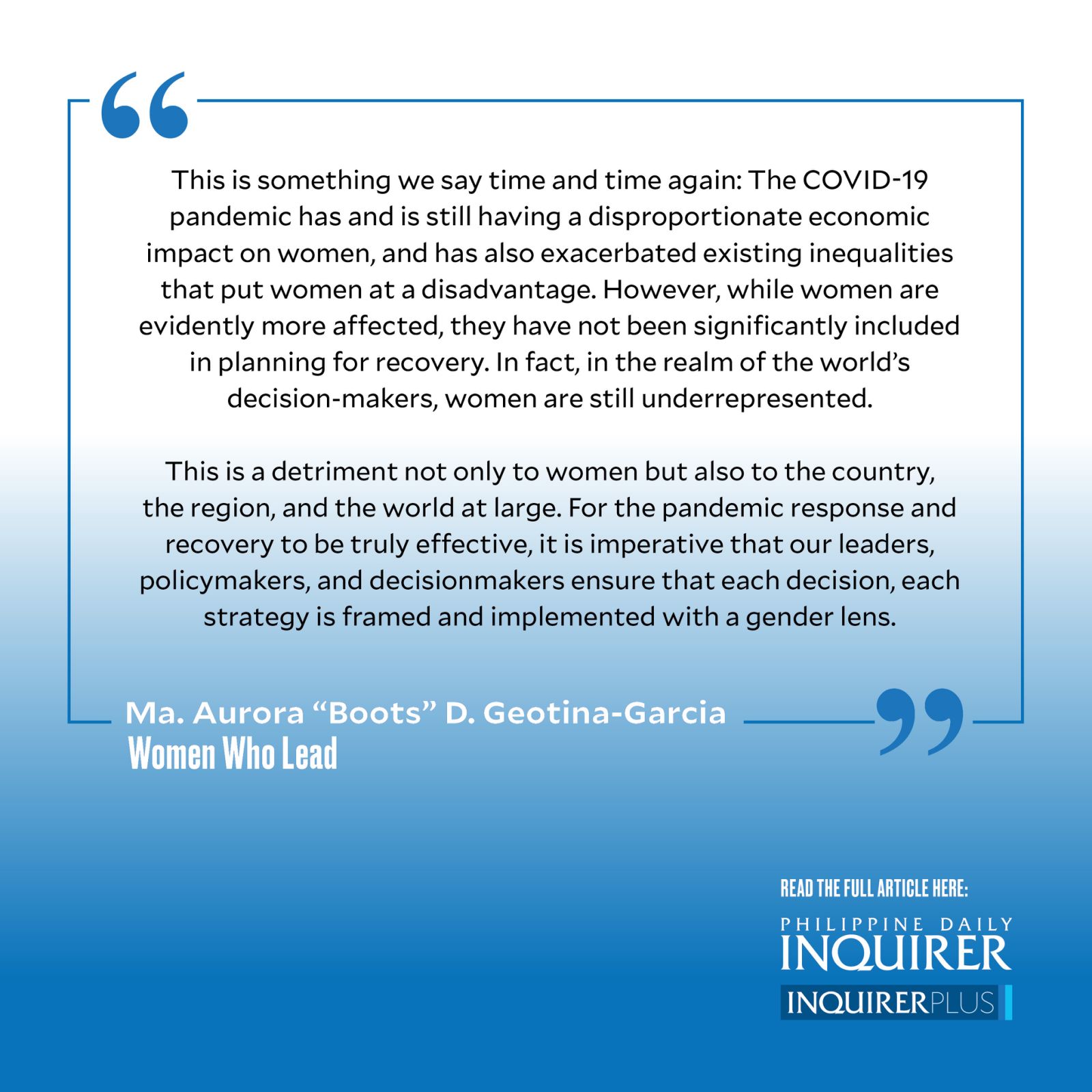
PhilWEN (the Philippine Women’s Economic Network), as the designated Project Lead of the Asean Women Entrepreneurs Network, recently held the virtual event “#EmpoweredWomen: Thriving and Resilient in an Equal Economic Community.” It was organized with support from the Embassy of Sweden in Bangkok and Oxfam’s Gender Transformative and Responsible Agribusiness Investments in South East Asia Project.
This is something we say time and time again: The COVID-19 pandemic has and is still having a disproportionate economic impact on women, and has also exacerbated existing inequalities that put women at a disadvantage.
However, while women are evidently more affected, they have not been significantly included in planning for recovery. In fact, in the realm of the world’s decision-makers, women are still underrepresented.
This is a detriment not only to women but also to the country, the region, and the world at large. For the pandemic response and recovery to be truly effective, it is imperative that our leaders, policymakers, and decisionmakers ensure that each decision, each strategy is framed and implemented with a gender lens.
Allow me to share some words from our speakers that should not go unheard, especially by the key bodies in the Association of Southeast Asian Nations (Asean). These are inspiring words from equally inspiring women leaders.
Datuk (Dr.) Hasfah Hashim, chair of the Women Leadership Foundation in Malaysia and the representative at the Asean Confederation of Women’s Organizations, shared data from a McKinsey report showing that the Asean region could gain up to 8.9 percent increase on top of the business-as-usual GDP, or an absolute accumulated GDP opportunity at $369 billion, if it closed the gender gap. “We must create a critical mass of women in leadership positions, and this is very important because we want to ensure that leaders create leaders,” she said. Hashim also reiterated the call for the Asean Business Advisory Council to have at least one female representative from each Asean member state.
The pandemic puts the case of unpaid care work front and center. But it is really nothing new. Nadira Yusoff, AWEN focal point in Malaysia and founder and CEO of Kiddocare, shared that women’s economic empowerment and participation in the labor force are hindered by childcare responsibilities. “We have to start looking into different kinds of childcare and care services as well as we move forward in embracing the future where work is mobile and flexible,” she noted.
Ana Margarita “Ginggay” Hontiveros-Malvar, VP for reputation management of Aboitiz Equity Ventures, shared several best practices and progressive policies introduced and implemented in their company. “We really would like to contribute to the Asean Action Agenda on increasing women’s participation and leadership in the workforce,” she said, adding the need to intensify human capital development and capacity-building programs that will empower women to bear equal roles with men in all sectors.
(In case you missed the event, you may watch it by accessing this link: https://bit.ly/EmpoweredASEANWomenLive.) We close off the year with much hope and optimism about what 2022 has in store for the women empowerment movement. The pandemic may have put the women’s movement a few steps back, but I am confident that with women’s strength and resilience, we will be able to overcome all these challenges. Whether this be the outcome of the 2022 Philippine elections or positive gender-equal changes in the workplace, or key decision-making bodies finally giving women that proverbial seat at the table, women will take back 2022 and pave the way forward.
——————
Ma. Aurora “Boots” D. Geotina-Garcia is the founding chair and president of the Philippine Women’s Economic Network (PhilWEN).
——————
Women Who Lead is an initiative of the Philippine Women’s Economic Network (PhilWEN).

